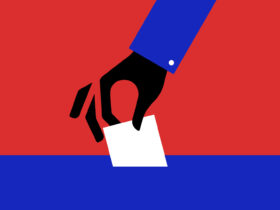The 2020 United States Presidential Election was arguably one of the most contentious in history. Amidst a global pandemic, the nation watched as President Donald Trump sought re-election against former Vice President Joe Biden. While many Americans celebrated Joe Biden’s victory, a significant portion of the population believed the election was rigged, stolen and fraudulent. The misinformation surrounding the 2020 election ultimately led to a violent attack on the U.S. Capitol building.
In Delaware County, Pennsylvania, local officials still grapple with lawsuits claiming election fraud in the 2020 election as recently as February 2023. Similar suits are being filed in numerous other counties nationwide, despite a lack of credible evidence supporting claims of election fraud.
According to Lisa Schaefer, the executive director of the County Commissioners Association of Pennsylvania, officials in these counties face a never-ending stream of individuals who refuse to accept the overwhelming evidence supporting the election’s integrity. Instead, these individuals resort to yelling and insulting those who disagree with them.
Where did this misinformation come from, and what explains some Americans’ unwavering belief in election fraud despite a lack of evidence? By analyzing these phenomena, we can better understand why specific individuals resist accepting the truth about the 2020 election.
One of these factors is motivated reasoning, a cognitive process in which people use their preexisting beliefs and values to evaluate new information and form judgments. It is a phenomenon in which people tend to interpret information in a way that confirms their preconceived notions and beliefs while dismissing or ignoring information that contradicts them. In the context of the 2020 U.S. Presidential Election, motivated reasoning led many Americans to interpret information in a way that confirmed their belief in election fraud.
Do Americans truly believe the election was fraudulent?
Certainly. An important finding from a recent University of Massachusetts at Amherst poll revealed that only 21% of Republican voters believe that Joe Biden won the 2020 election legitimately. This result has been replicated across multiple polling firms utilizing various modes of data collection, including phone interviews and online surveys.
The consistency of the results across different modes of data collection suggests that participants were not influenced by the social desirability bias, whereby participants respond in a manner that conforms to social norms or makes them look good. This consistency proves that many Republicans honestly believe the election was fraudulent and are not afraid to admit it.
Where did Americans hear these allegations of election fraud?
Former President Donald Trump played a prominent role in spreading misinformation about the election. In the months prior to the election, Trump tweeted, “RIGGED 2020 ELECTION: MILLIONS OF MAIL-IN BALLOTS WILL BE PRINTED BY FOREIGN COUNTRIES, AND OTHERS. IT WILL BE THE SCANDAL OF OUR TIMES.”
Trump’s statements fueled a strategic distrust of mail-in ballots among his supporters. Since Democrats were twice as likely to vote by mail than Republicans on Election Day, Trump encouraged his supporters to question the legitimacy of any Democratic victory. On the night of the election, Trump tweeted: “We are up BIG, but they are trying to STEAL the Election. We will never let them do it. Votes cannot be cast after the Polls are closed.”
Many other high-profile Republican officeholders also fueled this misinformation. State officials from Pennsylvania, Michigan, Georgia, and Nevada also supported election fraud claims. To “stop the steal,” some of these officials even sponsored trips to Washington on Jan. 6, 2021, the day of the insurrection.
The claims of distrust in the election by influential Republican Party figures served as a catalyst for social learning within their followers, as evidenced by the stark contrast in election fraud claims between Republicans and Democrats. According to the social learning theory, individuals acquire attitudes and values through observing and emulating others in their social group. In this case, the theory explains why Republicans are more inclined to adopt these views, as they mirror the stances of the political leaders they identify with.
The media was another primary driver of belief in election fraud, with certain outlets amplifying false claims about the election. Fox News constantly broadcasted false claims that Donald Trump had been cheated of victory in the days and weeks following the election, even though its staff members privately dismissed them as “totally off the rails” and “completely bs” off the air. This performative coverage reinforced the belief in election fraud among Trump supporters, who were more likely to trust these sources of information than mainstream media outlets.
Despite the lack of evidence to support these claims, many Americans believed them because they were motivated by their preexisting beliefs about the election. Trump supporters were more likely to believe in election fraud because they were already committed to the idea that the election was rigged against Trump. As a result, they were more susceptible to motivated reasoning.
Social media also played a role in spreading misinformation about the election. Many false claims about election fraud were shared on platforms like Facebook and Twitter. These claims were often shared without any fact-checking or critical evaluation, spreading incorrect information.
The night of the election, the hashtag #StoptheSteal appeared on Twitter after a misleading voter fraud video went viral. The video displayed a man being denied entry to a polling station in Philadelphia. In reality, the man was told that his poll-watching certificate was invalid at that particular location. Videos like this went viral across social media platforms and created large “Stop the Steal” Facebook groups, which amassed over a million members.
The growth of the internet has enabled individuals to easily access information and find a community of like-minded individuals who share their beliefs, regardless of how baseless they may be. In the past, such claims of conspiracies would have been dismissed by a more diverse and heterogeneous group with varying backgrounds and knowledge.
However, the internet has facilitated the formation of echo chambers where individuals can reinforce their biases and become even more polarized, a phenomenon known as group polarization. These echo chambers create a feedback loop where individuals are only exposed to information that confirms their beliefs, resulting in a heightened level of motivated reasoning and a tendency only to trust those within their social group. This phenomenon is particularly evident in the United States today, where citizens only trust those in their same party.
Many people in the United States have internalized their political views and party affiliation to such an extent that they have become an integral part of their identity. As a result, their feelings about political issues often stem from a sense of loyalty rather than a deep understanding or rational analysis of the facts. Unfortunately, altering someone’s deeply ingrained beliefs can be highly challenging, particularly when their political ideology and party affiliation are intertwined with their sense of identity.
Ultimately, the issue of motivated reasoning and misinformation in the 2020 election highlights the importance of a well-informed and engaged citizenry. In a democracy, people must be able to make informed decisions based on accurate information rather than being swayed by their biases or deliberate attempts to mislead them.
If political figures continue to perpetuate misinformation about the election process, denying the results of elections could become a norm in American politics. If Americans continue to deny the integrity of their own elections, the January 6th insurrection of the Capitol Building could be just the beginning of greater attacks on the government.
The U.S. must make changes to ensure that Americans have the tools to detect and reject misinformation before it is too late. Some broad remedies that could reduce the threat of misinformation are issuing warnings at the time of initial exposure to potential misinformation on social media and increasing the costs on individuals and institutions that spread misinformation.
Currently, Fox News is being sued for defamation for $1.6 billion by Dominion Voting Systems. If Dominion Voting Systems wins the lawsuit, this case could serve as a serious example and deterrent for those spreading misinformation in the future. By promoting media literacy, critical thinking and transparency in our election processes, we can work to ensure that our democracy remains strong and vibrant for years to come.







